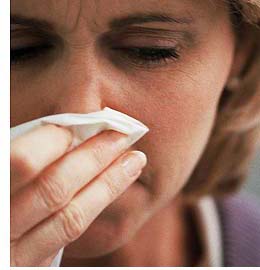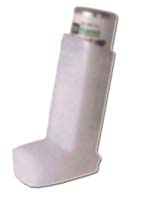 |
|||||
|
|
Fall 2006 New Guidelines Will Help You Breathe Easy Pharmacology and Delivery Devices: What Works Best for Your Patient? Asthma Management: Barriers to Care News Bits
|
|
|
New Vaccine Offers Long-Term Relief from Seasonal Allergies
The research was carried out at Johns Hopkins University School of Medicine, where investigators tested the vaccine during two fall ragweed seasons in 25 volunteers between the ages of 23 and 60. All were known to suffer from ragweed allergies. Fourteen received the active injections while the remaining 11 received placebo shots. Allergic symptoms were monitored and recorded throughout the test period. Results showed people who received the active injections experienced a 60 percent reduction in all of their allergy symptoms, including sneezing, runny nose, watery eyes, and itching. The effect was just as strong in year two of the trial as in year one, suggesting the vaccine offers long-term relief. The investigators now plan to study the vaccine over a longer period to examine its lasting effects in a larger group of patients. The study was funded by the Immune Tolerance Network, which is funded by the National Institute of Allergy and Infectious Diseases and the National Institute of Diabetes and Digestive and Kidney Diseases (both components of the National Institutes of Health), and the Juvenile Diabetes Research Foundation International. It was published in the Oct. 5 issue of The New England Journal of Medicine. Study Weighs Best Practices for Asthma Management Asthma action plans have long been touted as a way to help asthma patients better control the condition. But not all asthma action plans are created alike. With some, treatment decisions are guided by daily symptoms. With others, decisions are based on daily peak flow monitoring. A July report in the Cochrane Library suggests that keeping track of daily symptoms outperforms peak flow monitoring in children. The authors combined results from four major studies comparing daily symptom tracking to peak flow monitoring. Children in the daily symptoms group made 27 percent fewer visits to the emergency department or physician for severe asthma flare ups than those in the peak flow monitoring group. The authors speculate peak flow monitoring may be less effective in kids because children often have difficulty using the devices, and that could lead to inaccurate measurements. Asthma Patients Have No Idea When MDI Doses Run Out
The 6.5-minute telephone interview was conducted among a random sample of 500 U.S. families with a member who has asthma. Only 36 percent of bronchodilator users reported having ever been advised of the importance of keeping track of their medication doses. About a fourth of the 342 people who said they used a bronchodilator to treat acute symptoms had experienced an empty inhaler during an acute exacerbation. Among this group of 87, 71 said they considered their inhaler empty only when “absolutely nothing came out.” Seven patients in this group were forced to call 911 for assistance. The authors believe these results point to the need for all metered-dose inhalers to come equipped with dose counters. The report appeared in the July issue of the Annals of Allergy, Asthma and Immunology. Improper Use of Home Nebulizers May Be Leading to Deaths Among Asthmatics The Michigan State University study looked at all asthma-related deaths in people aged two to 34 that occurred in Michigan between 2002 and 2004. Eighty-six deaths were noted overall; 38 involved children. Researchers obtained medical records for the patients and conducted interviews with family members to determine how nebulizer use or misuse might have figured into the deaths. Among the 52 patients prescribed a home nebulizer at the time of their death, only 30 were using the device regularly and only 19 used it prior to the fatal event. The researchers note these results suggest many home nebulizers are not being used in accordance with National Asthma Education and Prevention Program guidelines. |
|

 A new study finds just six injections over six weeks of an experimental DNA-based vaccine can protect people from seasonal ragweed allergies for at least two years.
A new study finds just six injections over six weeks of an experimental DNA-based vaccine can protect people from seasonal ragweed allergies for at least two years. A new survey conducted by the Allergy & Asthma Network/Mothers of Asthmatics finds most asthma patients don’t know when their inhalers are out of medication.
A new survey conducted by the Allergy & Asthma Network/Mothers of Asthmatics finds most asthma patients don’t know when their inhalers are out of medication. Inappropriate use of home nebulizers may be leading to unnecessary deaths in asthma patients, report investigators who presented their findings at last fall’s CHEST 2006 conference.
Inappropriate use of home nebulizers may be leading to unnecessary deaths in asthma patients, report investigators who presented their findings at last fall’s CHEST 2006 conference.